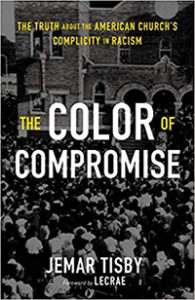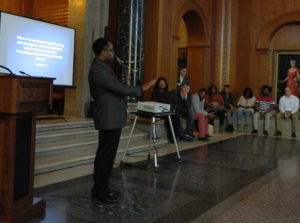WACO—The persistent plague of racism in the United States requires conscientious American Christians not just to be non-racist but to become anti-racist, cultural commentator Jemar Tisby told a Baylor University audience.
Most Americans occupy the middle ground of non-racism, between virulent racists and committed anti-racists, but racism is woven into the fabric of American history and culture, he asserted.
So, active engagement in fighting racism is the only way to avoid enforcing the status quo, said Tisby, president of The Witness: A Black Christian Collective and co-host of the Pass the Mic podcast.
 Tisby, author of the newly released The Color of Compromise: The Truth About the American Church’s Complicity in Racism, spoke on “How to Fight Racism” at the invitation of the Baylor Institute for Studies of Religion, addressing a standing-room-only crowd in the Armstrong Browning Library’s McLean Foyer of Meditation.
Tisby, author of the newly released The Color of Compromise: The Truth About the American Church’s Complicity in Racism, spoke on “How to Fight Racism” at the invitation of the Baylor Institute for Studies of Religion, addressing a standing-room-only crowd in the Armstrong Browning Library’s McLean Foyer of Meditation.
‘Underlying myth of white supremacy’
Americans in general—and Christians in particular—need to understand how racism works in order to comprehend why it “keeps cropping up like an un-killable cockroach,” he said.
“The simple but effective playbook of racism is based on the underlying myth of white supremacy,” he said. “Systems change, but racism persists because we haven’t changed the narrative of racial difference.”
The “narrative of racial difference” predated Colonial America, and it provided the foundation for 246 years of race-based chattel slavery and 89 years of Jim Crow segregation, as well as the less overt systems of racial injustice still in place, he asserted.

“White supremacy maintains power through violence,” Tisby said. “Taken to its logical conclusion, white supremacy and racism kills.”
During the Jim Crow era, the “narrative of the Lost Cause” presented a romanticized version of the Old South and demonized black people—particularly black men, who were seen as beasts who would prey upon white women unless restrained, he said.
Sign up for our weekly edition and get all our headlines in your inbox on Thursdays
After slavery was abolished, plantations and mines in the South still needed free labor. So, Jim Crow-era vagrancy laws criminalized black men’s inability to find employment, and the convict leasing system provided laborers who literally could be worked to death, Tisby explained.
“It’s sometimes said that slavery was America’s original sin. Slavery was the original symptom. The original sin was greed,” he said.
Although Supreme Court rulings and landmark legislation ended segregation, American culture remains racialized—embedded in the normal operations of institutions and often invisible to white society, he insisted.
Racialization is supported by much of white evangelical Christianity and a “hyper-individualism” that emphasized personal salvation but often pays little attention to public expressions of justice, said Tisby, a graduate of Reformed Theological Seminary.
‘ARC of racial justice’

In response, he urged American Christians to fight racism at the intellectual, interpersonal and institutional levels through what he calls the “ARC of racial justice,” which stands for awareness, relationships and commitment.
To increase awareness, he recommended documentaries such as “13th,” “The African-Americans: Many Rivers to Cross” and “King in the Wilderness,” along with books including Divided by Faith: Evangelical Religion and the Problem of Race in America, Stamped from the Beginning: The Definitive History of Racist Ideas in America and At the Dark End of the Street.
He also encouraged visits to the National Civil Rights Museum in Memphis, Tenn.; the Smithsonian National Museum of African-American History and Culture in Washington, D.C.; and the Legacy Museum and National Memorial for Peace and Justice in Montgomery, Ala.
Tisby encouraged cross-cultural and interracial friendships to build meaningful relationships. He pointed to a study that reveals the average black American has eight white friends, but the average white American has only one black friend.
Finally, he called on people of faith to make a commitment to act against institutionalized injustice and attack systems of oppression. He specifically singled out two initiatives—criminal justice reform and a movement to make Juneteenth a national day of celebration.
Too often, people of faith who know they should stand against injustice fail to act out of fear, he said. In particular, white Christians who should speak up “in places where black people are not present” allow fear of rejection to silence them.
“When you go into battle to fight racism, know that the Lord God is with you wherever you go,” he said, alluding to Joshua 1:8. “You don’t have to be afraid.”
















We seek to connect God’s story and God’s people around the world. To learn more about God’s story, click here.
Send comments and feedback to Eric Black, our editor. For comments to be published, please specify “letter to the editor.” Maximum length for publication is 300 words.